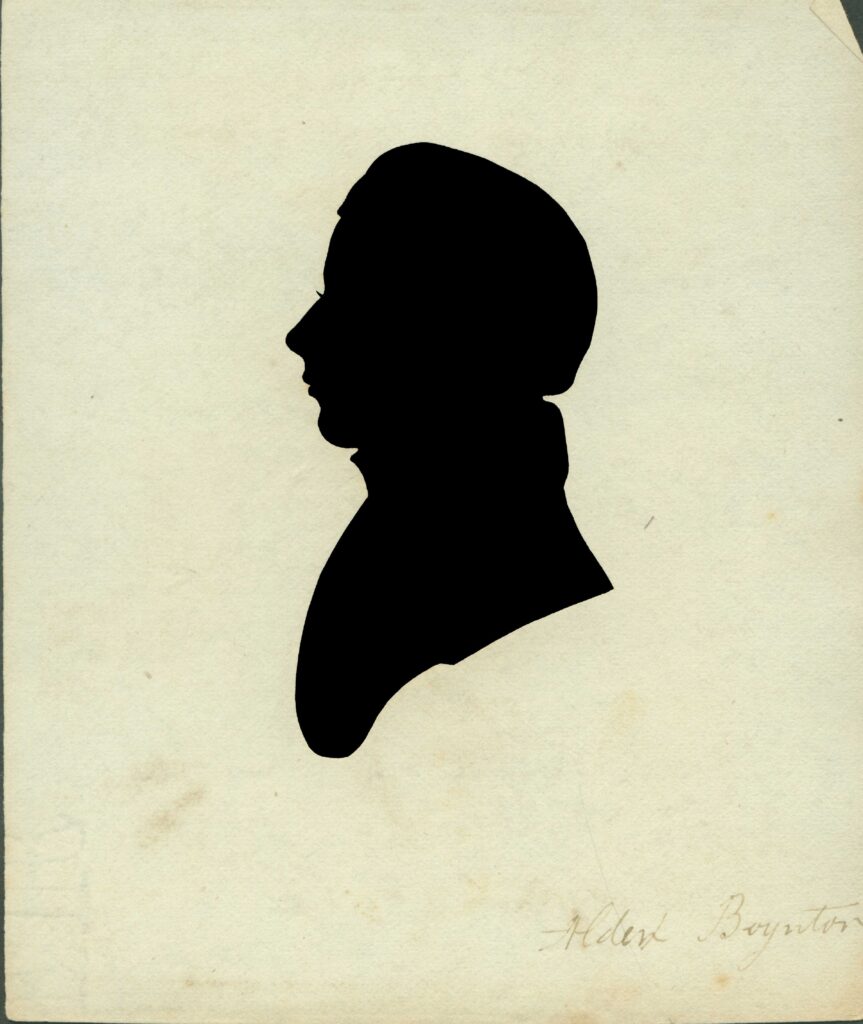
Exercise Advocate & Enemy of Green Fruit
Alden Boynton was born in Wiscasset, Maine, in 1805. His mother Sarah and his father John had several sons, of which Alden was the youngest. While many other members of the Class of 1825 grew up with status and wealth, Alden had a far less privileged childhood. When Alden was born his father was a prosperous shipmaster who could afford to build a home in Wiscasset Village. Then, in 1807, President Jefferson passed the Embargo Act, which destroyed John Boynton’s business and cost him all but one ship. With his last ship, he attempted to sail to Lisbon to obtain a shipment of salt that could recoup his losses. But in his haste, John accidentally sunk the ship and left his family penniless. The Boyntons had to relocate from their village home to a farm on the outskirts of town. As the only child still at home, Alden had to do much of the manual labor that would keep his family afloat.
Even though many financial burdens fell upon the Boyntons, they remained committed to educating their children. Alden’s parents were able to send his brother John to Bowdoin, where he graduated in 1820 and became a teacher and clergyman. John and Sarah also saved whatever they could to furnish Alden with books and send him to school. When Alden was eleven, a high school opened in Wiscasset and the boy was selected to attend. The school was 3.5 miles from Boynton’s farm and Alden often had to make the trek back and forth pn foot. Alpheus S. Packard, a tutor who would become a Bowdoin professor, took charge of Boynton’s education. The boy spent a term studying under Packard at Wiscasset High School and then received private lessons from the tutor for twelve weeks afterward. That single year of school was the only formal education that Boynton ever received before entering Bowdoin. Instead, the boy would mostly study on his own, teaching himself Latin during the “long evenings and stormy weather” of his early teen years. During this period it is possible that Boynton was acquainted with future Bowdoin classmates Hezekiah Packard, who was Alpheus’ brother and a Wiscasset residence, and John S.C. Abbott, who shared Alpheus as a tutor.
Boynton matriculated at Bowdoin at the age of fifteen. However, he spent his first year of college living in Wiscasset and completing his studies from home. His sophomore year, Boynton moved to Brunswick and lived with his brother John. Boynton’s experience at Bowdoin was far from pleasant. He felt a great deal of homesickness his first year in Brunswick, which was not helped by his brother who preferred to mock him rather than comfort him. Boynton also reports making few friends and spent most of his time studying alone in his room. The scholar also reported becoming chronically ill soon after entering Bowdoin, which he attributed to a lack of exercise and inadequate portion control. Most bizarrely, he attributes his sickness to “eating too much green fruit.”
By the end of his sophomore year at college things started to look up for Boynton. With regular exercise and medical advice from the college, his illness started to dissipate. He lived with Samuel Page Benson his junior and senior years, suggesting that he had at least one friend. Still, Boynton had a hard time letting loose a Bowdoin. An anomaly amongst his peers, Boynton was never fined at all by the Executive Government for petty misbehavior. This could be a result of Boynton’s strict discipline, his antisocial nature, or because his family’s precarious finances meant that he could not afford to rack up fines like the rest of his peers. Ultimately, Boynton’s somber work ethic paid off. He spoke at both student exhibitions of 1824 and 1825, and participated in a forensic disputation with David Shepley at Commencement entitled, “Whether the Safety of our Government is endangered by the Extent of Territory?” Shepley and Boynton both graduated sixth in their class.
After Bowdoin, Boynton’s life was again shaped by the needs of his family. His father died in October of 1825 and Boynton returned to Wiscasset to take charge of the farm. Simultaneously, he began to study law under a local attorney. After a year of this Boynton realized he was too weak to do manual labor and that he disliked law. As such, he moved to China, Maine, to take over an academy there. While in China, Boynton attempted to obtain a license to preach, despite having never seriously studied theology. The Kennebec Preacher’s Association saw potential in the young man and awarded him a license. With this newfound power, Boynton travelled along the Penobscot River, preaching in its various communities. He spent several years as a minister in both Industry and North Portland, but a return of his college illness brought an end to his career as an itinerant clergyman.
Boynton’s poor health became something of an obsession to him, judging by the sheer space he devoted to it in his correspondence. The clergyman agonized endlessly over the causes of his disease and recounted in detail the symptoms that he endured. His suffering forced him to move back to Wiscasset, where he ran the family farm with his mother. He took great pleasure in the visits of his extended family and filled in at the pulpit when preachers were absent. Boynton also became a state legislator, elected by Wiscasset’s citizens between 1849 and 1853. Learning from the mistakes of his parents, Boynton was especially proud that he never racked up any debt. He died in 1858 of the same illness that had plagued him since Bowdoin. He never married, nor had children, but was praised by his community for being a man “of marked meekness of character and unostentatious in his life and labors.” His most fervent wish was for Bowdoin students not to repeat his mistake of valuing sedentary studying over physical education.